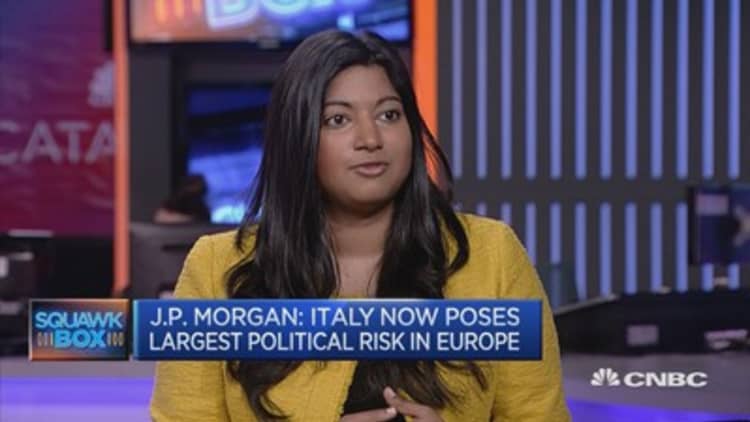With several elections already out of the way in Europe, Italy now presents the biggest political risk for markets and investors, an investment analyst told CNBC.
This is a result of political risk in the rest of Europe subsiding, according to Nandini Ramakrishnan, global market analyst at JPMorgan Asset Management.
In March, the Netherlands held a general election where incumbent Prime Minister Mark Rutte defeated anti-EU politician Geert Wilders. Earlier this month, the centrist candidate Emmanuel Macron saw off the far-right Front National leader Marine Le Pen.
"As we've gone through the year, the Dutch (and) the French elections have gone in what we'd call the less-risky or more market-friendly result," she told CNBC's Squawk Box on Friday.
"And actually all of that is based on euroscepticism and Macron, as a victor, is not posing the most Eurosceptic risk in France."

However in Italy, polling data shows there is little support for the euro and if a referendum were called then many would be voting to leave the euro.
"That could be potentially disastrous for the monetary union, for the European Union. You can't just leave the euro and not leave the EU," she explained.
Ramakrishnan's concerns about Italy have been echoed elsewhere. Fabio Fois, a Barclays economist, says Italy risks political paralysis if it cannot approve a better voting system ahead of next year's election.
"As the current government seems to have little of the political capital needed to press ahead with meaningful supply-side reforms, we expect Italy to continue to underperform peers, until political prospects for the formation of a stable pro-reform coalition government improve," he said in a research note published Tuesday.
"Therefore, Italian sovereign risks are likely to worsen in the months ahead. The situation may not necessarily end in a full-blown crisis as in 2011, but it will require meaningful political and policy change."
The yield on has increased from around 1.5 percent to 2.1 percent over 12 months. The yield spiked to above 2.5 percent in mid-March.
Wolfango Piccoli, co-president of Teneo Intelligence, warns the most likely outcome of the next general election is a hung parliament.
"There is a significant chance that no agreement will be reached on a new electoral law, thereby forcing Italy to go to the general elections with the current different electoral laws (basically proportional representation albeit with different rules for the two chambers) for the chamber of deputies and the senate," he said in a research note on Monday.
"As for the timing of the next general elections, our base-case remains that Italy will go to the polls in the spring of 2018, after the end of the current parliamentary term. The likelihood of snap elections in the autumn of this year is only 25 percent."


